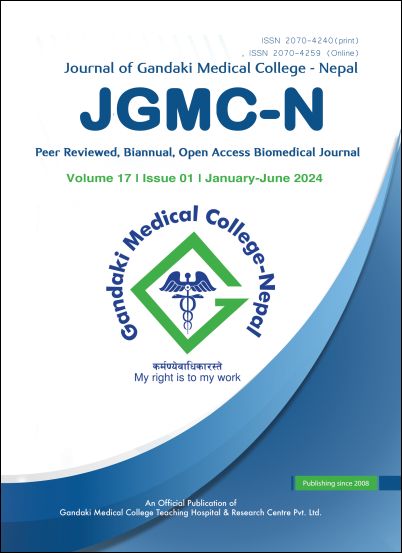Anxiety and depression among senior citizens of Pokhara Metropolitan, Kaski, Nepal: A cross-sectional study
DOI:
https://doi.org/10.3126/jgmcn.v17i1.64387Keywords:
Anxiety, depression, senior citizensAbstract
Introduction: A decrease in physical and cognitive functioning, and poor social relationship makes older people more vulnerable to anxiety and depression. The objective of this study was to assess anxiety and depression among senior citizens of Pokhara metropolitan city, Kaski, Nepal.
Methods: A cross-sectional comparative research design was adopted to assess anxiety and depression among senior citizens residing in an old age home and at their own home. An old age home in Pokhara was randomly selected and samples were selected using census method from that center. Then, an equal number of participants were selected from a randomly selected ward of Pokhara i.e. ward no 17 who were living in their own homes using a convenience sampling technique. Structured standard tools like Anxiety Scale-10 (ADS-10) and Geriatric Depression Scale- short version (GDS-15) were used for data collection and the data were collected using the interview technique. Descriptive statistics (mean, frequency, percentage, and standard deviation) and inferential statistics (chi-square test and independent t-test) were used.
Results: Among 80 respondents, 30.00% had severe anxiety symptoms, 16.25% had moderate anxiety symptoms, 62.50% of respondents had suggestive depression symptoms and 10.00% had no depression. Anxiety level was significantly associated with their status of living (p=0.045) and having comorbidity (p=0.027). Depression level was significantly associated with work status (p=0.036) and having co-morbidity (p=0.013).
Conclusions: Nearly half of the respondents had anxiety symptoms whereas one-third had depression symptoms. Senior citizens living in old age homes reported more symptoms of anxiety and depression than those who were living in their own homes. It is necessary to address the psychological aspects of the elderly and manage them holistically.
Downloads
Downloads
Published
How to Cite
Issue
Section
License
Copyright (c) 2024 The Author(s)

This work is licensed under a Creative Commons Attribution-NonCommercial 4.0 International License.
This license allows reusers to distribute, remix, adapt, and build upon the material in any medium or format for noncommercial purposes only, and only so long as attribution is given to the creator.




